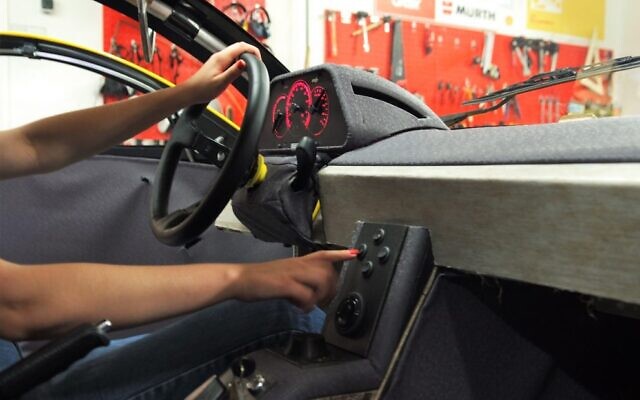A team of students from the Eindhoven University of Technology in The Netherlands has designed a zero-waste car made out of bio-based material developed by Israeli startup UBQ Materials.
The Israeli firm has patented a process to convert household trash, organic, paper and plastic, including banana peels, dirty diapers, used yogurt containers and cardboard — into a bio-based thermoplastic, or a plastic substitute, that can replace oil-based plastic, wood and concrete in the manufacture of everyday products.
The eco-motive car, called the Luca, was unveiled on October 8 by TU/ecomotive, a student company. The body of the car was manufactured out of UBQ material, and the aim was to show that waste can be valuable for a multitude of applications.
Luca’s chassis is composed of flax, recycled polyethylene terephthalate (PET) and polypropylene (PP) coming straight out of the ocean; the seat cushions are made of coconut fiber and horsehair, and the front and rear parts of the chassis are made out of a tube frame from recycled aluminum, UBQ said in a statement.

The inside of the Luca, a ‘zero-waste car’ made out of bio-based material developed by Israeli startup UBQ Materials, Oct. 8, 2020 (Bart van Overbeeke)
Luca is also designed to be highly energy-efficient. The car’s in-wheel motors mitigate losses in the drivetrain, and the two electric motors have a combined power of 15 kW, powered by six modular battery packs. The packs are easily swappable, so that when new technology is available in the future they can be replaced by more modern batteries.
The next step for TU/ecomotive is to obtain a license plate for Luca, the statement said. By ensuring that the car is road legal, the team wants to prove that sustainable innovation is ready to implement across the automotive industry.
Every year, the student company TU/ecomotive of Eindhoven University conceptualizes and manufactures an electric car to show the world that the hypothetical, sustainable car of the future can be a reality.
UBQ Materials was founded in 2012 by entrepreneurs Rabbi Yehuda Pearl and Jack (Tato) Bigio. The firm has raised $27 million from Battery Ventures and private investors, according to the database of Start-Up Nation Central.
This isn’t the first time material developed by UBQ has been used in automotive manufacturing. In January, the startup said it would collaborate with Germany’s Daimler, the manufacturer of Mercedes-Benz cars, for the use of the thermoplastic for a range of automobile parts throughout Daimler’s supply chain.
According to Quantis, a provider of environmental impact assessments, every ton of UBQ material produced diverts up to 12 tons of CO₂ equivalent, qualifying the technology “as the most climate positive thermoplastic material on the planet,” the statement said.
 RSS Feed
RSS Feed















 October 13th, 2020
October 13th, 2020  Awake Goy
Awake Goy  Posted in
Posted in  Tags:
Tags: 













